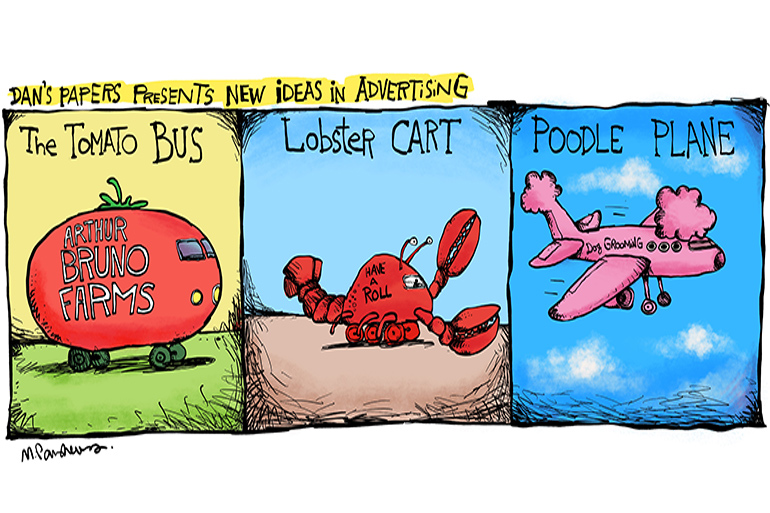Hey, Look Here! Billboards OK on Hamptons Vehicles, Unless There's Nothing But Signs?

There’s been a significant uptick in the number of mobile billboards traveling the roads of the Hamptons. They are very recognizable, which is the whole idea.
A flatbed truck hauls these big, flat panels around, standing them on end in the flatbed, going nowhere, just circling around in the most well-traveled parts of town where, sometimes 8 by 10 feet or larger, they can be seen by the most eyeballs. They advertise restaurants. They advertise upcoming events. They advertise bars. I’ve seen them advertising Tate’s Cookies—a photograph of an enormous bag of chocolate chip cookies is to be seen on both sides. One’s mouth waters. It drives away. Event producers occasionally advertise coming events on these signs on wheels.
There are ordinances against standard billboards in both East Hampton and Southampton. In East Hampton, the law says that billboards, “an outdoor sign located elsewhere than upon the same lot upon which the advertised business is located, whether flash, blink or flicker, along with any sign that exceeds 10 feet in height and classified by definition as billboards, are illegal.” The Southampton ordinance says that any moving sign, flashing or not, is illegal.
You don’t really hear about or see ordinance officers out giving tickets to the drivers of moving billboards, though, and the reasons seem obvious. First of all, what is the difference between a truck hauling a box trailer filled with bags of cookies with the image of bags of chocolate chip cookies on the side making deliveries, and one that’s just a billboard truck? Both make the same visual intrusion as they toodle along. So does a big metal moving van, empty but with a sign on each side stating the name of the delivery truck company. Furthermore, maybe a billboard truck is traveling from one community, where they are legal, to another community where they are legal, but have to pass through a community where they are not legal?

There’s a particular little open-air shuttle bus in both East Hampton and Southampton that takes people from the parking lots at the far end of town to the beach and back. They are called Free Ride because, in fact, they are free to be boarded anywhere along their routes, and they make their money, this private business, by placing advertisements on the vehicles, promoting things like cranberry juice or coconut water, and nobody stops them.
It’s a bit like that “appropriate dress” ordinance in Southampton Village, passed long ago and still on the books, which says that a person must cover their body with some sort of clothing from just above the nipple (they call it the areola) to midway between the hip and the knee. I’ve never heard of anybody getting arrested for walking around town wearing a whole lot less than that.
In the early days of Dan’s Papers, back in the 1960s, I bought two one-ton Chevy vans that employees could drive around, delivering the newspapers. Just a few years earlier, the towns of Southampton and East Hampton passed laws making stationery billboards illegal. This community was largely farmland then, and billboards advertising tractors or pickup trucks were by the sides of the road all over the place. It was felt the billboards blocked scenic views, which they did. It was felt they were junking up the towns, which they were. Members of the Ladies Village Improvement Society said they had to go. So they did.

As for me, I had no qualms deciding to make my delivery trucks into traveling advertisements. I painted them cherry red and emblazoned with the Dan’s Papers logo I used at that time in bright white, 10 feet by 6. They were visible a hundred yards away. No other trucks had such bold advertising like that back then. And just to rub it in, I painted the number of the truck in big letters on the cab doors. On the driver’s door it said it was No. 6. On the passenger’s door it said it was No. 22. There were those who thought this was serious and there were those who got the joke.
There was nothing in those early laws making traveling billboards on wheels illegal. Anyway, the towns have recently had some complaints from the public about traveling billboards. But when the cops responded to the complaints, they often found that the perps had fled the scene. Damn.



